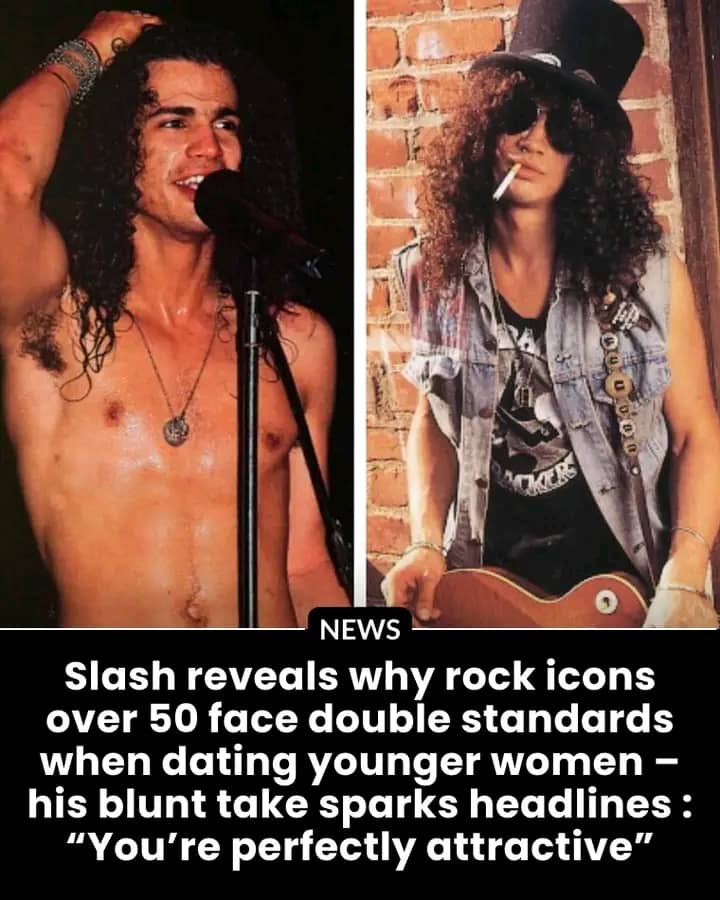
When it comes to Slash, rules have never been part of the vocabulary. The top-hatted legend who turned a Les Paul into a weapon of mass seduction has always lived on the edge—of riffs, of rebellion, of rock ’n’ roll excess. But this time, it isn’t a guitar solo that has fans’ jaws on the floor.
It’s his mouth.
In a candid moment that’s now spiraling into one of the most heated debates in music culture, the Guns N’ Roses guitarist lit up the internet with a blunt declaration:
“You’re perfectly attractive at any age.”
It sounds harmless enough—almost wholesome, even. But then came the kicker: Slash aimed his words straight at one of rock culture’s most controversial flashpoints—the scrutiny older stars face when dating younger partners.
And just like that, the guitar god wasn’t just riffing about music anymore. He was stomping into one of society’s ugliest minefields: age, love, and the power imbalances that people love to pretend don’t exist.
The Double Standard Slash Wants Dead
Slash isn’t wrong about one thing: rock ’n’ roll has always run on contradictions.
When older women date younger men, the headlines often gush with empowerment clichés—“She’s still got it!” “Cougar queen!” Hollywood practically throws a parade. But swap the genders, and suddenly older male rockers are painted as creepy, manipulative, or worse.
Slash, now in his late fifties, sees it as nothing short of hypocrisy. “The world’s obsessed with youth, but attraction doesn’t come with an expiration date,” he insisted, pushing back against critics who sneer at May-December romances in rock.
On the surface, it’s the kind of swagger-laced mic drop only Slash could pull off: unapologetic, rebellious, and dripping with that same defiant streak that made Appetite for Destruction a generational shockwave.
But is it really that simple?
Fans Split: “Preach, King” vs. “Nice Try, Grandpa”
The internet reaction was immediate—and brutal.
On one side, legions of fans rushed to defend the guitarist’s stance. “Hell yeah, Slash is right,” one fan tweeted. “Love doesn’t care about age—stop acting like he owes anyone an apology.”
Another chimed in: “This man has survived heroin, band wars, and the jungle of Hollywood. If he says age is just a number, I believe him.”
But not everyone was buying it. Critics slammed Slash for sidestepping the uncomfortable truth: age-gap relationships often come with massive power imbalances. Fame, money, and status—especially in a world where young women are conditioned to idolize rock stars—blur the lines of consent in ways a casual soundbite can’t erase.
“Slash can play a mean solo, but he can’t solo his way out of basic ethics,” one critic shot back. “It’s not about attraction—it’s about exploitation.”
The result? A digital mosh pit, with fans and critics swinging verbal fists over whether Slash was dismantling ageist stigma—or just dodging the hard questions.
Rock ’n’ Roll’s Age-Old Problem
The truth is, this debate didn’t start with Slash—and it won’t end with him.
From Elvis and Priscilla to Jimmy Page’s notorious teenage flings, rock’s history is littered with uncomfortable age gaps that critics now view with a sharper, less forgiving lens. Back then, it was shrugged off as part of the “wild lifestyle.” Now, it’s a cultural landmine.
Slash’s comments strike at the heart of that tension. Is he simply defending the right to love whoever you want, regardless of age? Or is he leaning on the same old excuses rock stars have used for decades to shield questionable behavior?
It’s a question with no easy answer—and one that leaves fans torn between nostalgia for a reckless era of rock and the realities of a society that’s finally questioning its heroes.
Why Slash’s Words Hit Different
Part of the reason Slash’s comment lands with such force is because of who he is.
This isn’t some TikTok influencer chasing headlines. This is the guy who turned “Sweet Child O’ Mine” into a global anthem. A survivor of the debauched Sunset Strip, a man who’s buried friends, fought his own demons, and come out the other side still wielding a guitar like a chainsaw.
When Slash speaks, people listen—not because he’s polished or politically correct, but because he’s raw, unfiltered, and almost allergic to bullshit. That authenticity is exactly what makes his words so dangerous. They feel true, even when they’re messy.
The Question Slash Won’t Answer
At the end of the day, Slash’s stance forces fans into a corner. On one side: the rock ’n’ roll dream that love and attraction should be free, unchained, immune to rules written by pearl-clutching critics. On the other: the reality that age-gap relationships aren’t just about “chemistry”—they’re about power.
Slash gave us the easy part—the rebellion, the defiance, the soundbite. What he didn’t give us was the hard part: an acknowledgment that attraction across decades can get ugly when fame and influence tilt the scales.
Maybe he knows that’s not his fight to win. Or maybe he’s just too old-school to care.
Either way, the question lingers, buzzing louder than a Les Paul through a Marshall stack: is Slash the last honest voice defending love in all its forms—or the last relic of a culture that refuses to grow up?
One Thing’s Certain: He Lit the Fuse
Love him, hate him, or scream at him on Twitter, Slash has once again done what only rock stars of his caliber can: sparked a fire that forces people to take sides.
In a world where most celebrities bury their opinions under PR-polished soundbites, Slash dropped a truth bomb with no warning, no filter, and no fear of backlash.
The riffs may be eternal, but the conversation? It’s just getting started.

Leave a Reply